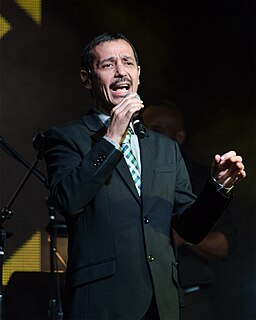
Eddie Santiago

"No Me Ames" is a Latin pop duet recorded by American singers Jennifer Lopez and Marc Anthony for Lopez's debut studio album, On the 6 (1999). It is a Spanish cover version of the Italian song "Non Amarmi", written by Giancarlo Bigazzi, Marco Falagiani and Aleandro Baldi and recorded by Baldi and Francesca Alotta for Baldi's album Il Sole (1993). The song was translated into Spanish by Ignacio Ballesteros at Anthony's request. Two versions of the song were produced for On the 6; one as a ballad and the other as a salsa. The ballad version was produced by Dan Shea, while the salsa version was arranged and produced by Juan Vicente Zambrano. The music video was directed by Kevin Bray and received a Latin Grammy nomination for Best Short Form Music Video. It served as the encore during the couple's co-headlining tour in 2007.
El día que me quieras is an Argentine tango with music by Carlos Gardel and lyrics by Alfredo Le Pera. It is considered one of the most popular songs of the 20th century and one of the best Latin songs of all time. Originally featured in the 1935 film of the same name, sung by Gardel himself, it became a heavily recorded tango standard, even by artists outside of the realm of tango. It has subsequently been covered by various artists such as Luis Miguel, Julio Iglesias, Michael Bolton Roberto Carlos, Raphael de España and Shlomo Idov who translated the song to Hebrew. The song was inducted into the Latin Grammy Hall of Fame in 2001. "El día que me quieras" was honored at the 2014 La Musa Awards as "La Canción de Todos los Tiempos". It was among the tango standards selected by Plácido Domingo for his 1981 album Plácido Domingo Sings Tangos. In addition to Domingo, the song has been covered by operatic tenors including José Carreras, Juan Diego Florez, Christian Ketter, and Alfredo Kraus.

"A Puro Dolor" is a song recorded by Puerto Rican band Son by Four. It was written by Omar Alfanno and released as the first single of the second studio album of the band in 1999. Two versions of the track were produced by Oscar Llord for the album; one as a salsa and the other as a ballad. The ballad version was arranged by Alejandro Jaén.

"Non c'è" is an Italian ballad written by Pietro Cremonesi, Angelo Valsiglio and Federico Cavalli and recorded by pop singer Laura Pausini. It is the second single from the singer's first album, Laura Pausini. The song was also recorded in Spanish under the title "Se fue" and included in Pausini's Spanish-language debut album, released in 1994. A remix version of "Se fue" was released in 1994 and became popular in Spanish dance clubs. The song later became one of Pausini's best known singles.

"Strani amori'" is a song by Italian singer Laura Pausini, released in February 1994 as the first single from her second studio album, Laura.
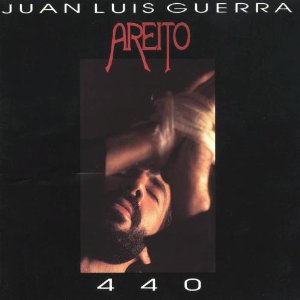
Areíto is the sixth album by Juan Luis Guerra with his band 440, released on December 8, 1992, by Karem Records. The album, meant to be a tribute to the indigenous tribes of the Dominican Republic, is named after a dance that the aboriginal inhabitants of the Greater Antilles (Taínos) accompanied with songs during their festivals and religious rites. The album contains twelve tracks including "Cuando te Beso", interpret by Santo Domingo Philharmonic Orchestra. Congolese musician Diblo Dibala played guitar on the song "El Costo de la Vida", which was a Spanish cover of his own soukous song "Kimia Eve", while the last track on the album, "Naboria daca, mayanimacaná", is sung in Arawak, the language of the Taíno people. Areíto was originally set to be released in early April 1992, but was first delayed to the end of October 1992 and was finally released on December 8, 1992.
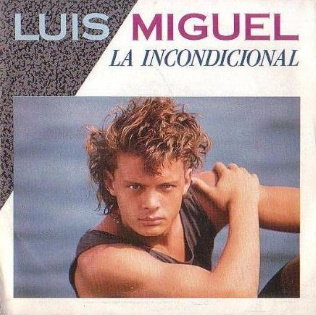
"La Incondicional" is a pop song written, produced, and arranged by Spanish Juan Carlos Calderón and performed by Mexican singer Luis Miguel. It was released in 1989 as the third single from his studio album entitled Busca una Mujer (1988) and became his second #1 single on the Billboard Hot Latin Tracks chart after "Ahora Te Puedes Marchar" in 1987. The song broke several airplay records in Latin America, topping the charts in Mexico, Chile and Peru; and the top-ten in other countries. The success of the song helped push the album to #3 on the Billboard Latin Pop Albums with approximate sales of four million units.
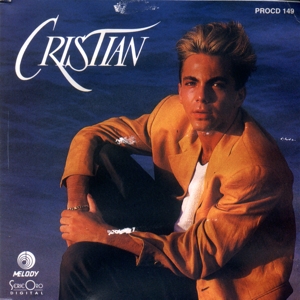
"Nunca Voy a Olvidarte" is a song written by Roberto Belester and first recorded by Mexican grupero band Bronco for their album Salvaje y Tierno (1991). In the song, the protagonist is leaving and vows to never forget the time he spent with his lover. In 1993, Mexican singer-songwriter Cristian Castro covered the song on his album, Un Segundo en el Tiempo. Castro's version peaked at number-one on the Billboard Hot Latin Songs chart in the United States became his first number-one single.

"Dile" is the first single from Don Omar's debut album, The Last Don (2003). It was released airplay in May 2004, and released in iTunes on July 25, 2005 along with the track "Intocable". The song samples Joe Arroyo's 1988 song "La Noche".

"Fuego Contra Fuego" is the debut single by Puerto Rican singer Ricky Martin from his debut solo studio album Ricky Martin '91 (1991). It was released by Sony Music Mexico and CBS Discos on September 9, 1991. A music video was also released.
"Inolvidable" ("Unforgettable") is a song written by Julio Gutiérrez in 1944. It is considered one of the most popular boleros released during the Cuban musical movement led by pianists. The song has been recorded by several performers, including Roberto Carlos, Diego El Cigala, Fania All-Stars, Eydie Gormé, Danny Rivera, Tito Rodríguez and Bebo Valdés, among others.
The 11th Lo Nuestro Awards ceremony, presented by Univision honoring the best Latin music of 1998 and 1999 took place on May 6, 1999, at a live presentation held at the James L. Knight Center in Miami, Florida. The ceremony was broadcast in the United States and Latin America by Univision.
The Lo Nuestro Award for Tropical/Salsa New Artist of the Year is an honor presented annually by American network Univision. It was first awarded in 1989 and has been given annually since to recognize the most talented performers of Latin music. The nominees and winners were originally selected by a voting poll conducted among program directors of Spanish-language radio stations in the United States and also based on chart performance on Billboard Latin music charts, with the results being tabulated and certified by the accounting firm Deloitte. At the present time, the winners are selected by the audience through an online survey. The trophy awarded is shaped in the form of a treble clef.
"La Media Vuelta" is a song written and performed by Mexican singer José Alfredo Jiménez released in 1963. One of Jiménez' most famous compositions, the song has become part of the traditional Mexican musical repertoire, and has been recorded by dozens of singers and groups.

"Rezo" is a song by Puerto Rican entertainer Carlos Ponce from his 1998 eponymous debut album. The song was co-written by Ponce and Freddy Piñero, Jr. with productions being handled by Emilio Estefan and Kike Santander. It was released as the lead single from the album on May 12, 1998. A pop and tropical power ballad with a gospel chorus, the singer leads a prayer for a woman he desires. A remix of the track was also included in the album. The song received positive reactions from three music journalists.
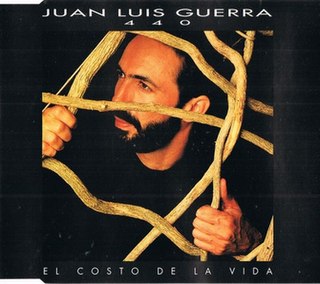
"El Costo de la Vida" is a song by Dominican Republic singer-songwriter Juan Luis Guerra released as the third single from his sixth studio album Areito (1992). The track is collaborated by the famous Congolese musician Diblo Dibala on guitar and is a Spanish cover of his own soukous song "Kimia Eve". The lyrics to the song make references to the poverty, corruption and low-life standards in Latin America. Also, lyrics about poor conditions in many Latin American countries, the celebration of the 'discovery' of America and the double standards of first-world nations. The music video was banned in several countries for been to graphic and sparked some controversy due to many considered the lyrics contained on the song had anti-capitalist tendencies.

"Mi Mayor Venganza" is a song by Puerto Rican singer La India from her fifth studio album, Sobre el Fuego (1997). The song was written by Rodolfo Barreras and produced by Isidro Infante, and released as the album's second single in 1997 by RMM Records. It is a salsa song, in which La India tells the woman to keep the man who cheated on the artist out of revenge.

"Píntame" is a song by Puerto Rican American singer Elvis Crespo from his 1999 second studio album of the same name. The song was written by Crespo with Luis Angel Cruz and Robert Cora handling its productions. It is a merengue song in which Crespo asks an artist to materialize his lover by painting her. The song was met with positive reactions from three music critics who found the song to be catchy. An accompanying music video for the single features Crespo dancing with other performers in a white background.

"Por Mujeres Como Tú" is a song by Mexican singer Pepe Aguilar from his 1998 studio album of the same name. The song won Billboard Latin Music Award for Hot Latin Song of the Year and was nominated in the category of Regional Mexican Hot Latin Track of the Year. It also won the Lo Nuestro Award for Regional Mexican Song of the Year in 1999. In addition, the track was recognized as song of the year on the Regional Mexican field field at the ASCAP Latin Awards. In 1999, Puerto Rican salsa singer Tito Rojas covered "Por Mujeres Como Tú" on his studio album, Alegrías y Penas. Rojas' version peaked at #1 on the Tropical Airplay, his second and final #1 before his death. Rojas' cover was nominated in the category Tropical Song of the Year at the 2000 Lo Nuestro Awards, but lost to "Píntame" by Elvis Crespo. It was recognized as one of the best-performing songs of the year at the ASCAP Latin Awards under the salsa category in 2000.















